| Agony Column Home | |
A Queer Eye on the Mean Streets
The Agony Column for
November 20, 2003
Updated with new Illustrations March 1, 2004
Commentary by Terry D'Auray
|
|
|
| Raymond Chandler defined the "mean streets". |
Joseph Hansen
wrote his first Dave Brandstetter novel 'Fadeout' in 1967. He wanted
to write "a good whodunit", but he also "wanted
to right some wrongs". He followed with eleven subsequent
wrong-righting Brandstetter books; the last 'A Country of Old
Men' published in
1991. While Brandstetter is not a card-carrying detective, we'll
give him
his bone fides. He's an insurance investigator in LA, ferreting
out scoundrels or scammers who are bilking his insurance company
for mega
bucks, which back then was a bad thing, or who are killing people,
which is still a bad thing. He's middle-aged at introduction,
none too swift-of-foot or fierce-of-fist, but he makes his way
quite
ably by being smart and shrewd. And he's also gay, matter-of-factly,
oh-by-the-way,
but openly gay. In 1967!
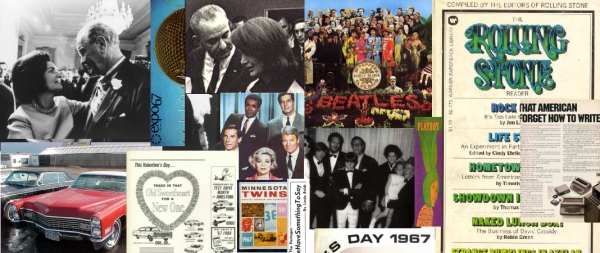
Think back. In 1967, Lyndon Johnson is President; the Chicago Democratic
convention and riots haven't happened yet; The Beatle's Sergeant Pepper
is the top album (no CDs yet); Jackie O is alive and not yet married
to Ari; 'Mission Impossible' is the number one-ranked TV drama (and
The Monkees won the Emmy for best TV comedy - yeah, yeah, yeah, I'm
a believer); Roe v Wade is 9 years off; and The Rolling Stone printed
its first, yes very first, issue. AIDS is undiscovered, and Stonewall
is just another bar in New York's West Village. Here's Hansen, writing
a novel about a middle-aged gay insurance investigator with nary a
wisecrack or serial killer, and getting it published! Well, getting
it published three years later in 1970, by Harper and Row. Viewed
from 2003, that's all pretty tame stuff. But in 1967, even 1970, it
was neither tame nor stuffy.
Hansen was a surprising low-key writer to be breaking such
new ground. (Not to imply that he's no longer around. He's
alive,
just not writing.)
He blended setting, plot and characters in stories that were
timely and perceptive, but sensible and realistic, suspenseful,
but above
all, quite calm. Unwilling to sensationalize his character,
and eschewing "action-packed" in
favor of modest violence and taut tension, he created Brandstetter
as a tenacious semi-plodder with brains not brawn, so unassuming as
to be wholly believable and wholly inoffensive. Just a regular gay-guy-next-door.
Nothing lurid, nothing risqué, nothing scary to the
70's reader. Nothing even particularly genre shattering, unless
you
believe, as
many did then, that a gay detective is, by definition, genre
shattering.
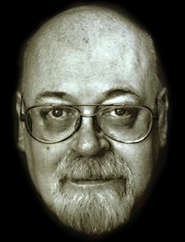
Hansen was completely up-front and unapologetic about his character's
sexuality. Brandstetter's serial relationships with men, from hunky
young things to older, wiser soul mates, are openly and unabashedly
described in each of his novels, with honesty and tenderness at times,
with exasperation and despair at others.
Hansen's books reflect the gay world, and many of his plots
involve gay characters, but he treats the entire gay theme
routinely. By so doing, he delivers the message that homosexuals
are quite
ordinary,
basically no different from anyone else, a message none too
extraordinary
now, but at that time, not at all common. Homosexuals in mysteries,
if they appeared at all, were vilified scum. His books often
feature parallel stories, one a Chandleresque story of crime
and the other
a story of gay relationships and sexuality that turned the
clichés
of the time upside down. His writing is elegantly styled,
witty and descriptive, and his dialogue rings true. He is,
looking
back, a great
chronicler of the LA of the late 60's and 70's, describing
in readable detail its houses, cars, food and fashion, bars
and
nightlife. Of
course, those descriptions now would send the 'Queer Eye'
Fab Five to their cell phones, frantically dialing 911-Pottery
Barn.
Oops.
Pottery Barn hasn't been invented yet, nor have cell phones,
and Tommy Hilfiger is still in his nappies. It's a lava lamp
and Mary
Quant
world, reflected in the cover images of his original first
editions, displayed in their full-size
glory in this gallery.
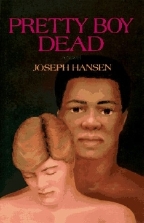
Hansen reflects the gay world.
Hansen's later books tackle more socially and politically
conscious themes, pornography in 'Skinflick', the AIDs epidemic
in 'Early
Graves', published in 1987, and the Vietnamese sub-culture
in 'Obedience'. He pulled Brandstetter from retirement in
the disappointing
finale,
'A Country of Old Men" in 1991. He probably shouldn't
have.
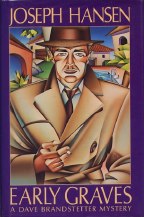
The smoking gun is ever-present in mystery fiction.
Hansen, while not widely read and certainly not widely promoted,
developed a loyal following among both straights and gays.
Did the Brandstetter
series open publisher's doors to gay mystery novelists? If
at all, certainly not wide, and certainly not with welcome.
Does
the Brandstetter
series rank with the best mystery novels of the time? Although
not unnoticed in his time, and not unheralded, probably not.
Hansen presented a homosexual as the protagonist, not the
sleazy villain,
in solid,
well written mysteries. Groundbreaking, but not earth shattering.
Did Hansen succeed in his mission to "write good whodunits
and right wrongs"? Absolutely, with honesty and old-fashioned
good storytelling and without stridency. And some thirty years
later,
he's left us with over a dozen novels, and a number of Brandstetter
short
stories, well worth reading, or re-reading.
While there's some chronological overlap between Hansen's last Brandstetter
and Michael Nava's first Henry Rios, there is a vast gap in
political and social climate. Michael Nava published his first series-novel
featuring Henry Rios, a gay, Latino, Stanford educated attorney
in 1986. Take Hansen and turn the dial up a few notches on
the intensity
scale, and you've got Nava. His setting is the LA of the 80's
and 90's, with race riots, police corruption, unrest, and distrust.
Toss
in Rios' strong Latino ethnicity and
you have a seven book series that was both original and timely.
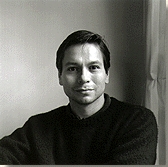
Michael Nava, author of the Henry Rios Novels.
Since Rios is a lawyer, the whodunit stories are structured in
the Earl Stanley Gardner attorney-uncovers-true-circumstances-to-save-client
mode. (Sorry for all those hyphens.) Unlike Gardner's Perry Mason,
who seemed to sit around while others did the dirty work (off
camera),
Harry does his own dirty work, and often pays the physical and
emotional price. Like later Hansen books, Nava's novels tackle
contemporary
themes; political corruption between the haves and have-nots in
the Mexican-American community in 'The Hidden Law'; the secret
life of
a closeted gay Supreme Court Justice in 'The Death of Friends';
and the compelling and powerful finale in 'Rag and Bone', about
abused
parents and their equally abused children. Unlike Hansen, Nava's
stories most often focus on Latinos wronged, not gays wronged.
But like Hansen,
he penetrates not the underworld, but the ignored world of mostly
ordinary people living mostly ordinary lives who face peril, both
physical and psychological, by virtue of simple circumstance.
Nava's novels, like Hansen's thread dual stories. Nava's novels
are as much about Harry Rios, the person, as Harry Rio the "detective".
He writes compassionately and sensitively about Harry's strained
relations with his family, about his friends, straight and gay,
and about his
series of lovers. These are emotionally compelling stories,
heart rending, and searing, simple and right-on real. The whodunits
are well crafted and suspenseful, but Harry's personal connections
are
poignant and elevate the series beyond the constructs of the
basic
mystery genre. The action uber alles set will find little to
like here; physical violence and sleaze are present, but controlled,
and the narratives turn on the more troubling social and psychological
violence done to one person by another.
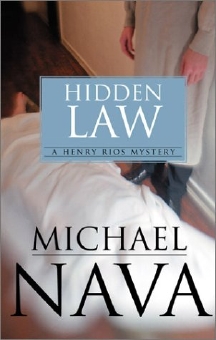
Michael Nava uncovers the Hidden Law.
Nava grew tired of his character well before his readers did.
Openly gay Henry was openly retired with 'Rag and Bone' in 2001,
the most
personal and complex novel in the series. Henry retired with grace
and dignity, leaving more than a few readers feeling like they'd
lost a good friend. For authors looking for ways to end a long-running
series that's lost its luster, (without killing off the protagonist)
look to Nava, who did it supremely well. Of course, finding Nava
may
be a bit of a challenge...he retired himself along with Rios and
has disappeared from the literary sub-culture.
Confessional personal stories and ancillary social agendas
can easily derail a good mystery - and the more intimate, emotional
or strident
they are, the greater the danger. Neither Hansen nor Nava
falls
prey. With skill, sensitivity and with their queer eyes
finely purposed,
they keep their stories on track and thread the personal
and social components so cleanly with the plot that they become
inseparable. Readers are rewarded with two series that are
compassionate and tough, innovative and satisfying, and, of
course, gay. All without Gucci!
|
|
| They did without. |

